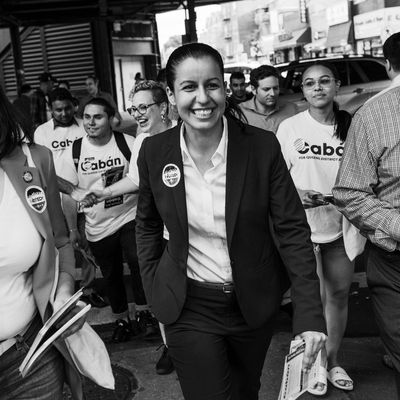
Queens district attorney candidate Tiffany Cabán finally conceded to Melinda Katz last night, after a highly publicized six-week battle over the results of the June 25 primary election, of which Cabán had initially been declared the upset winner.
Cabán, a public defender, was considered the New York progressive movement’s next Alexandria Ocasio-Cortez — a leftist challenger who refused corporate money and took on the establishment candidate, and whose victory would symbolize yet another blow to the Democratic Party machine. On election night, with Cabán ahead by 1,100 votes, there was a sense of elation among progressives; however, it deflated by morning as last-minute ballots for Katz trickled in, eventually putting her over Cabán by a mere 20 votes. After that razor-thin margin triggered a recount, and after a heated argument in court over contested ballots, Katz has now officially won by a lead of only 55.
Cabán’s background as a public defender running to become a “decarceral DA” set her apart from Katz immediately. Even though Katz, too, was running as a “progressive prosecutor,” broadly promising to enact reforms like ending cash bail for low-level offenses, Cabán soundly outflanked Katz to the left. Katz has deep connections to the real-estate industry, which has helped push primarily black and brown New Yorkers deeper into poverty, and to the political elite that has enabled it to do so; Cabán is a queer Puerto Rican woman who spends her days witnessing the myriad banal and cruel ways the police and the law can entrap poor, marginalized people.
Throughout her campaign, Cabán decried incremental reform. She called for resource distribution back to communities instead of to courtrooms; she embraced broader decriminalization of sex work; she supported the closing of Rikers as well as barring ICE from New York City courts. By the end of her campaign, Katz was adopting many of these stances, scrambling to emphasize her own progressive bonafides, even as she logged endorsements from party bosses like Andrew Cuomo.
On an ideological level, Cabán’s short-lived triumph symbolized so-called “radical” perspectives coming thrillingly into the mainstream. As a public defender, she has represented over 1,000 people in cases against the district attorney. That someone critical of the office might have a chance at occupying it once seemed impossible. Her commitment to policies like providing harm-reduction sites for drug users and decriminalizing sex work reflects a desire to help protect those who have long been seen as the state’s prime targets. Having Cabán in office might not have fully revolutionized the role of prosecutor, but it would have signaled a shift in how we think about punishment: that it hurts more than it helps, that we need to be smarter and kinder about how it is meted, and that people within the system deserve justice.
It’s tempting to feel Cabán’s loss as a huge blow, as an indication that any wins over the Goliath Democratic Party are just flukes. But we shouldn’t lose sight of the fact that Cabán lost by just 55 votes. Those in power can’t dismiss the wide appeal of her platform; her run has (hopefully) left them uncomfortable even in winning. “We terrified the Democratic establishment,” Cabán said last night. The role of district attorney, in a county with 2 million people that hadn’t seen meaningful reforms in decades, has now become tasked with enacting “fundamental change,” as Katz said in her speech accepting Cabán’s concession.
Katz will now have to deliver on those promises she made to end cash bail and to help close Rikers — and Cabán’s candidacy will reverberate beyond New York. She propelled ideas about trauma-based and alternative forms of justice to a national level, like her fellow “decarceral DA” Larry Krasner in Philadelphia. Except no other candidate has even attempted making the leap, like Cabán did, directly from public defender to DA, to say that the people closest to those suffering in the criminal-justice system should actually run it. Now, undoubtedly, more will.


